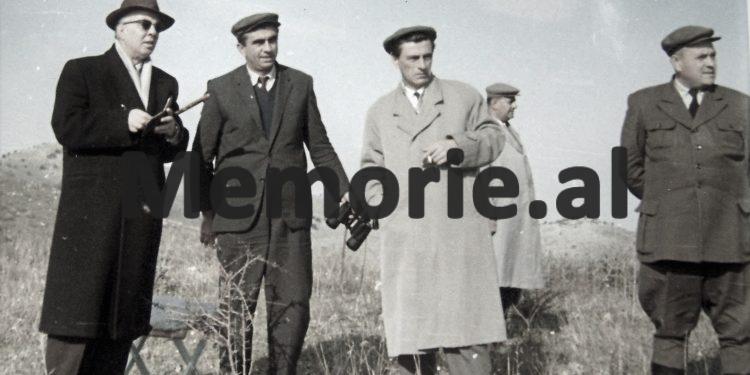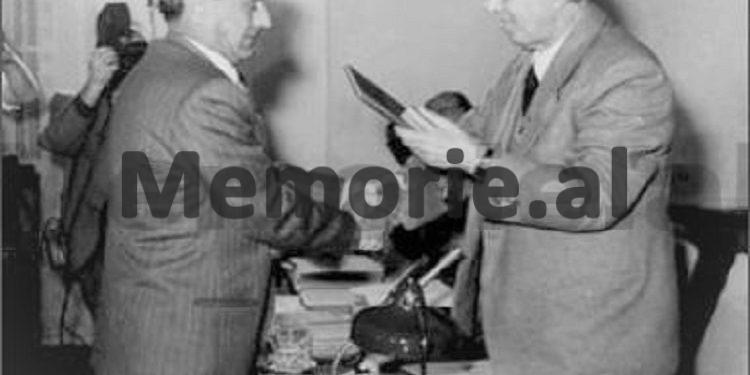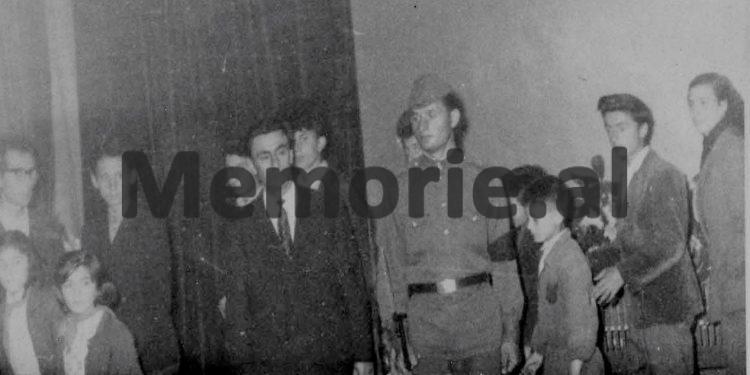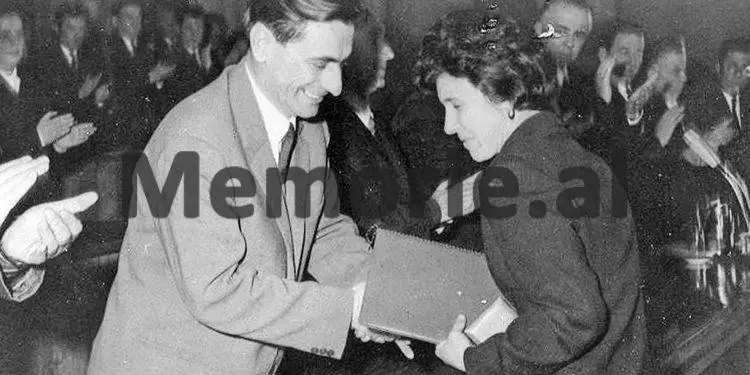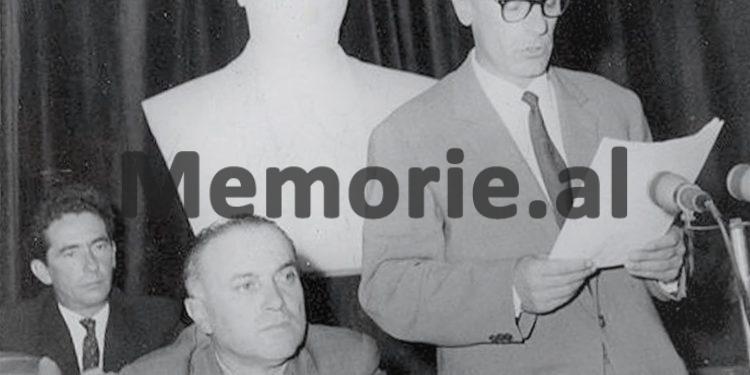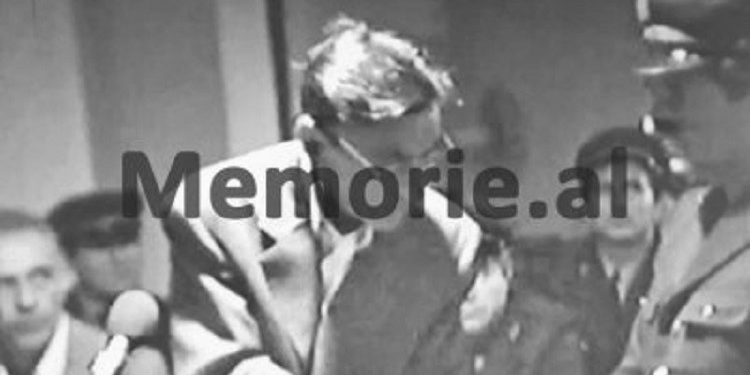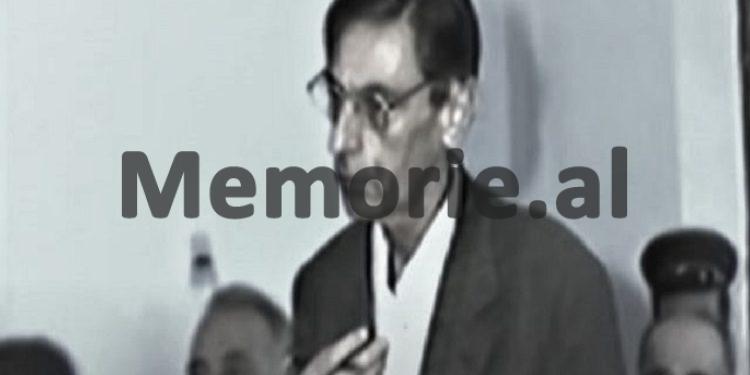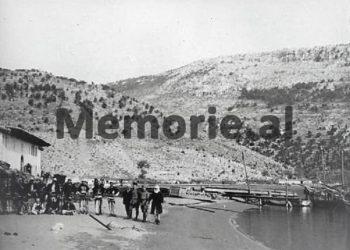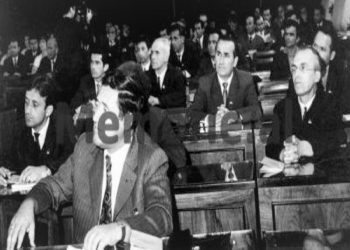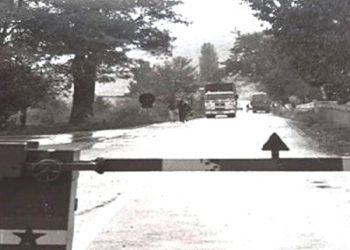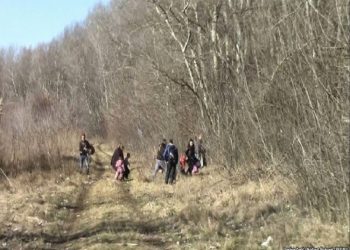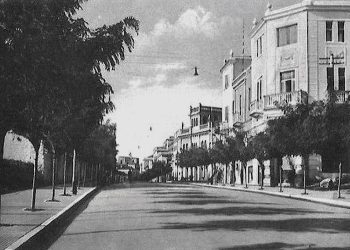Dashnor Kaloçi
Part six
Memorie.al publishes some archival documents extracted from the Central State Archive in Tirana (fund of the former Central Committee of the ALP), which have been unknown for 40 years and see for the first time the light of publication, where is a voluminous file with secret materials and documents belonging to the months of October 1982, where is reflected the material of the Political Bureau of the Central Committee of the ALP entitled “On the pronounced lack of vigilance and serious mistakes of Comrade Kadri Hazbiu at the time he was Minister of Interior “, written self-criticism of Kadri Hazbiu,” Decision of the 5th Plenum of the Central Committee of the ALP on expulsion from the Central Committee and the Party and dismissal from all state and social functions of Kadri Hazbit ”, as well as the minutes of the Plenum of the Central Committee held on 13 and 14 October 1982 in the main hall of the building of the Central Committee, where the work was discussed and analyzed and the activity of the Minister of National Defense, Kadri Hazbiu, who is accused of his “hostile activity” for the period of almost 30 years when he served as Minister of Internal Affairs. The complete file with all the documents that is published for the first time by Memorie.al, where in addition to the material “Top secret”, of the Politburo with accusations against the former Minister of Internal Affairs, Kadri Hazbiu, the minutes of Plenum, where Enver Hoxha and most members of the Politburo as: Ramiz Alia, Adil Çarçani, Foto Çami, Hekuran Isai, Manush Myftiu, Simon Stefani, Haki Toska, Pali Miska, Prokop Murra, Spiro Koleka, Rita Marko, Lenka Çuko, Muho Asllani, Llambi Gegprifti, Vangjel Çerava, and the Central Committee of the ALP, as; Nexhmije Hoxha, Gafur Çuçi, Xhelil Gjoni, Pilo Peristeri, Sofo Lazri, Piro Kondi, Petro Dode, Behar Shtylla, Shefqet Peçi, Qemal Bregasi, Dritëro Agolli, Mine Guri, Themie Thomai, Mehmet Elezi, Lumturi Rexha, Tefta Cami, , Harrilla Papajorgji, Anastas Kondo, Miti Nito, Sulejman Baholli, Halil Leli, Jashar Menzelxhiu, Enver Halili, Ali Vukatana, Tahir Minxhozi, Naunka Bozo, Luan Muhameti, Rexhep Kolli, Ndreçi Plasari, Sofie Çuadari, Nezir Jo, etc. have only accused former Minister Hazbiu, as a close associate of former Prime Minister Mehmet Shehu, but have also debated fiercely with him throughout the two-day plenum meeting, asking him to give explanations about the work and activity of from the day he sat in the minister’s office, starting from relations and relations with Russian advisers, the Tirana Conference in 1956, to “his cooperation with hostile groups” led by Teme Sejko, Beqir Balluku, Abdyl Këllezi dh of the “polyagent” Mehmet Shehu, as well as the decisions dismissals from duties and for the expulsion from the Central Committee of Rexhep Koli, Nazar Berberi, Veli Llakaj, Ndreçi Plasari, etc.
Continued from the previous issue
Minutes ‘Top secret’ of the meeting of the 5th Plenum of the Central Committee of the ALP, held on 13 and 14 October 1982
ALBANIAN LABOR PARTY
CENTRAL COMMITTEE Top secret
-General Sector-
MINUTES OF THE MEETING OF THE 5TH PLENUM OF THE CENTRAL COMMITTEE OF ALP ON 13 AND 14 OCTOBER 1982
The 5th Plenum of the Central Committee of the ALP in its meeting of 13-14 October 1982, considered:
- The material of the Political Bureau of the Central Committee of the ALP “On the pronounced lack of vigilance and serious mistakes of Kadri Hazbiu when he was Minister of Internal Affairs”, as well as the written self-criticism that Kadri Hazbiu addressed to the plenum of the Central Committee of the Party.
- Report of the Political Bureau of the Central Committee of the ALP “On the state of transport and measures to be taken to strengthen its organization and development in the service of the economy and the population.”
The meeting was chaired by Comrade Enver Hoxha, First Secretary of the Central Committee of the Albanian Labor Party.
The meeting was attended by all members and candidates of the plenum of the Central Committee of the ALP. His wife Marie Gjoni (Temali), a candidate of the Central Committee of the ALP, was absent for a reason.
In the first item of the agenda there were no guests, while in the review of the second item, on October 14, 1982, participated the comrades: Kostaq Lazri, assistant secretary of the Central Committee of the ALP, Miti Nito and Mihal Bisha , heads of sectors, Halil Hasko and Zenel Hysi, instructors of the Central Committee and Vançi Deti, employee in the apparatus of the Council of Ministers, in charge of transport.
The materials of the plenum meeting were read by the friends of the plenum in groups, before the meeting started.
MEETING DEVELOPMENT
- ON THE EMPHASIZED LACK OF VIGILANCE AND THE SERIOUS MISTAKES OF KADRI HAZBIU WHEN HE WAS AN INTERIOR MINISTER
COMRADE ENVER HOXHA: There are two issues on the agenda: first, the material of the Politburo “On the pronounced lack of vigilance and serious mistakes of Kadri Hazbiu when he was Minister of Interior”.
Second, the report of the Politburo “On the state of transport and measures to be taken to strengthen its organization and development in the service of the economy and the population.”
Do you agree with this agenda? (All friends agreed).
Then we start with the first item on the agenda.
I want to say a few words now, so that I can avoid my word at the end. You, comrades of the plenum of the Central Committee, have your opinion on the extremely serious mistakes and with great responsibility of Kadri Hazbiu, against the ruling Party and of course you will express it.
You read both materials. The first is, as it were, a synoptic picture of Kadri Hazbiu’s hostile activity, if it has not received this name. It is synoptic, because in the Politburo we have discussed many difficult problems, but they are not over.
All the files of the Ministry of Internal Affairs and the Ministry of People’s Defense will be examined one by one, to see how far, in what way and in what form this hostile work has taken place. But the leadership of the Party must be aware, that this is a deep, wide and multi-people hostile work: dangerous, less dangerous and lying.
This hostile work has been going on for a long time, since the liberation of Albania. The hostile base of the main elements, such as Mehmet Shehu and some others, is further away, even farther than the time of the National Liberation War. The origin of this work, as you know, is that during the war, but especially after the liberation during the pseudo-friendship with the Yugoslavs, with the Soviets and others.
Since then, a very dangerous and hostile job has been created at the head of the Ministry of Internal Affairs and the Ministry of People’s Defense, which, if left and not shattered by the Party in parts, because it was dialectical, would not there would be no more socialist Albania, no more Labor Party of Albania, but here capitalism and the bourgeoisie would reign.
Therefore those who have taken part in this hostile work are unforgivable enemies. The ball does not play that either.
In the Politburo we found that Kadri Hazbiu did not make good self-criticism. He has bombarded us with a lot of “self-criticism”, which we have returned. He bombarded us with letters of “loyalty” that were not needed, and with other letters to explain something that could not be explained.
All these issues, at the meeting of the Politburo, were raised by all the comrades on sound Marxist-Leninist principles and, as we say in the material you sang, we shook hands with Kadri, we told him that if the plenum of the Central Committee would ‘take the strictest measures, we will agree with him, because it is the Central Committee of the Party that decides on everything.
It is natural that every decision taken by the Central Committee is fairer, but we gave Kadri a hope. In the Politburo we told him to start working from the beginning from “a”, that he has made serious mistakes, even unforgivable, he has committed crimes.
When I read his “self-criticism”, I found that Kadri Hazbiu not only did not take into account the advice and help given by the Politburo, but he launched an attack against the Party, against its leadership and accuses us, saying: “Where are they? Were they the ones who sent these snakes to these ministries and this “angel” among the snakes “?!
In many paragraphs of his “self-criticism” he makes us accused. In a paragraph he says: “My fault is that I did not give these in writing, I was telling orally to comrade Hysni, yes and yes, but also to comrade Enver.”And if I did not tell Comrade Enver, Mehmet Shehu told him, Beqir Balluku told him.”
These are accusations that we reject with disgust, on these issues also means the Central Committee of the Party.
So, Kadriu, instead of moving forward, in his “self-criticism” he has turned back. And the meaning of this “self-critical” is to have a document where it says: “I am innocent”, despite the fact that it “admits” some “mistakes” when it says: “I was thrown, I was not vigilant, I was not very developed”. To whom does he say this? Tells us?! The enemy Beqir Balluku would throw Kadri Hazbi?!
We do not know who Beqir Balluku was?! He was a man without a head. But why was he appointed a minister? But who should we come to, Vehbi Hoxha, the factionis?! Beqiri led Kadri in a bad way?! That is, Beqiri was fine and Kadri was hairy?! Mehmet Shehu lied to Kadri Hazbi?!
But why didn’t Mehmet Shehu lie to us and break the Party line? He could not lie to us, that he was afraid of the Party, he was afraid of its leadership, but he was not afraid of his people.
Kadri Hazbiu did not understand this. In the “self-criticism” he gave to the Politburo, he said that just like us, he trusted Mehmet Shehu. No, Kadri, we did not trust Mehmet Shehu. We did not know that Mehmet Shehu was an agent, but we attacked him in all those moments when he made mistakes.
When he followed the line of the Party, of course we had nothing to say, while Kadri Hazbiu has followed the line of Mehmet Shehu for 30 years and during all this time, not to look at this line of Mehmet Shehu, but to evokosh that: “I told this to Mehmet Shehu”, “I told this to Beqir Balluku”, “I told this to comrade Hysni”, who unfortunately does not live now “, that this is what he said in His “self-criticism”, this is told not to admit any mistake!
Mehmet Shehu was a terrorist and he wanted to kill a number of comrades, in order to seize power, by coup, but Mehmet Shehu was unable, and no one is able to stage a coup against the Party. A terrorist can kill me or any other friend, but it is impossible to turn the Party back on its chariot. This made Mehmet Shehu commit suicide.
(Applause and calls: Enver Hoxha, Enver Hoxha).
We know that Veli Llakaj and Nazar Berberi were with Mehmet Shehu, he had called them himself a few days before he killed himself. We know that he told them that Sauk’s tanks should not move without his order, but he had no right to give orders, I had this right as Chairman of the Defense Council and Minister of Defense.
But even if he and the tank commander gave the order to carry it out, the tankers, when they learned that they were heading towards the Central Committee, would crush and tear to pieces the tank commander who would give such an order. Do these enemies have this price for the Party? Why, with some dung like Feçor Shehu and Llambi Peçini, would Mehmet Shehu suppress the Party?!
They were some ordinary and very dirty spies, while Kadriu does not tell us who Mehmet Shehu had as his main collaborator. This is what we want to know. Who is the main collaborator, who in fact allowed all these “mice” to work, but at the time when Mehmet Shehu carried out the assassination, he had him as a support to the people and the Party, that is, to be known as a man good, as a gentle man, as a man who puts his hand on his neck, etc., etc.?!
Mehmet Shehu needed such a man as support, that he could really kill a friend or two, but he could not kill the Party. Kirov was killed in the Soviet Union, but the Party could not be shaken.
So, this is what we want Kadriu to tell us and to tell us clearly all his faults, that in the “self-criticism” he has presented to us, he does not take any guilt. This is not the path a man who is called a communist should follow.
And in the end he says: “Time will tell”. What does this mean? This is a challenge that means that what we are putting here right now is not right, but time will tell that he is an “innocent” man. We will see what time will tell, what has now shown that his case is very bad.
I had these to say. Now you, Kadri, stand up and respond to the comrades of the Central Committee. Who wants to ask questions and then discussions? Do not ask me, you, comrades, are masters in your own house, I too here at the Central Committee meeting am like you, I am chairing the meeting.
(Comrade Xhelil Gjoni was taken).
COMRADE XHELIL GJONI: We read the “self-criticism” presented by Kadri Hazbiu and the materials of the Politburo and I have these questions for Kadri Hazbiu:
In his so-called self-criticism, he does not take any concrete responsibility, he tells us general words like “I take responsibility”, and others, the question I have is: What did Kadri do as Minister of Internal Affairs to discovered enemies, which task required?
You leave the enemies around, even, as Comrade Enver said now, it is not enough, and you are saying “bring them”. Who brought them? He brought Feçor Shehu himself as a “loyal” candidate for Minister of Internal Affairs.
Second, can you tell us what would happen to socialism, the Homeland, the people, the Party if Comrade Enver and the Politburo did not discover and crush these enemies? You were in the Ministry of Internal Affairs for this job, but you did not find out yourself!
COMRADE ENVER HOXHA: Yes, that’s right.
COMRADE XHELIL GJONI: In “self-criticism”, among other things, he says: “I have implemented the Party line sometimes from an opportunistic position, sometimes from a sectarian position”. His self-criticism is provocative and forces you to ask questions: Why did he implement the Party line in this way?
To implement a sectarian policy, as he says, that is, to hold sometimes sectarian and sometimes opportunistic attitudes and to do so specifically in the bodies of Internal Affairs means to commit crimes against the state, that is, to support the enemies who attack in various forms of crimes and fall into liberalism, fall into the arms of the enemy.
To fall into sectarianism is to punish innocent people. Two are these laws of class warfare, o here, o here, o with us, o against us. Now what is the responsibility, how do you Kadri explain this attitude that this is not just an ideology, but a concrete policy. Memorie.al
The next issue follows




